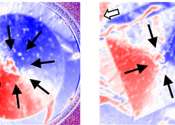Cosmic rays streamed through Earth's atmosphere 41,000 years ago: New findings on the Laschamps excursion
Earth's magnetic field protects us from the dangerous radiation of space, but it is not as permanent as we might believe. Scientists at the European Geosciences Union General Assembly present new information about an 'excursion' ...









